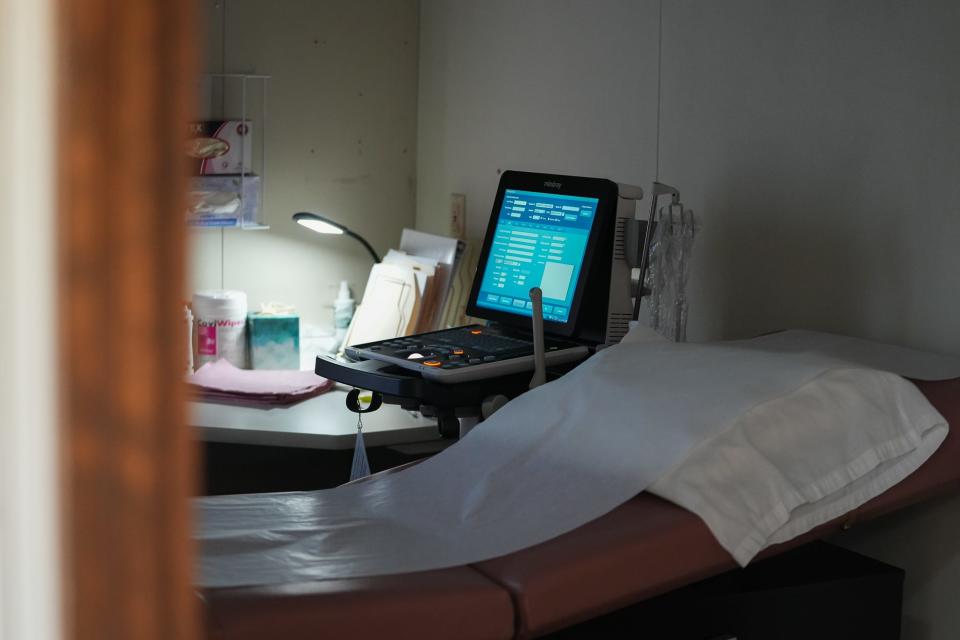Florida's 6-week abortion ban takes effect, and impact takes a quick toll
Inside a one-story clinic about 40 miles from the Georgia border, Kelly Flynn’s staff has provided abortions to women from across the Southeast since the Supreme Court overturned Roe v. Wade in 2022.
But on Tuesday, A Woman’s Choice clinic in Jacksonville, Florida, was seeing its last patients who fell outside of Florida’s strict new abortion law taking effect on Wednesday. The legislation prohibits most abortions after about six weeks – before many people know they’re pregnant.
Some arrived from Mississippi and Louisiana. One client was a college student who had learned last week that she was pregnant, said Flynn, fueling a quick decision as she and others scrambled to get care ahead of the new law.
"‘You know, I'm a college student. I'm not ready for this,’” Flynn recounted the student telling her.

Florida’s Supreme Court gave the state's new restrictions the greenlight in April. Now, those who are seeking an abortion beyond about six weeks of pregnancy are being redirected to clinics in North Carolina, Virginia, New Jersey, or other states – often setting up a daunting struggle to get time off work, obtain child care and afford costly travel.
Florida's court last month also cleared the way for a constitutional amendment protecting abortion access up to viability, often around 24 weeks, to be on November’s ballot.
While the outcome of that measure could override the state's current restrictions, abortion advocates and providers told USA TODAY the law's impact in the meantime is expected to ripple well beyond the state to other parts of the South.
Florida Gov. Ron DeSantis has celebrated legislation that bars a wide swath of abortions, saying last month that his home state is "proud to support life and family."
Florida residents face immediate effects
Abortions have been limited in Florida after 15 weeks, a cutoff DeSantis signed into law in 2022 when the Supreme Court overturned Roe v. Wade and almost 50 years of national abortion access. While more restrictive than the limits established by Roe, Florida’s 15-week ban was more than what many neighboring Southeastern states allowed, making it a common access point for out-of-state patients.
This new law includes exceptions for rape or incest if a person can provide documentation, such as a restraining order or police report. The ban also prohibits abortion drugs by mail.
In 2023, state data shows there were around 84,000 abortions performed in Florida and more than 4,200 abortions in Duval County, where the Jacksonville A Woman's Choice clinic is located. Flynn expects that number to tumble, and experts now anticipate an increase in women in Florida traveling for the procedure.
For patients who measure past six weeks in the coming days, Flynn said, “We’ll help them figure out – what do you want to do at this point? Your options are going to North Carolina or going to Virginia.”
The process will be burdensome for many, said Dr. Katherine Farris, chief medical officer for Planned Parenthood South Atlantic, which covers North and South Carolina, West Virginia and the western half of Virginia.
“Patients are going to have to jump over the states with total bans, like Alabama, jump over Georgia and South Carolina that have similar bans to Florida, and come up to North Carolina, Virginia, and areas to the northeast where there are fewer restrictions to abortion,” she said.
Abortion funds have worked to help women across the U.S. afford airfare, gas, time off work or child care to travel for an abortion. But Flynn worries that limited funds will quickly become overstretched.
However, while Florida’s law bans doctors from prescribing abortion pills through telehealth and mailing them to people, many residents will likely be able to use out-of-state telehealth to receive pills by mail. That's something that has been seen as difficult to stop, said Cheyenne Drews, deputy communications director for the nonprofit group Progress Florida.
Florida joins rest of South with abortion ban
Farris said abortion restrictions in the South since Roe was overturned have been “absolutely devastating.”
“The bans are creating chaos,” she said.
Abortion opponents, though, are celebrating the Sunshine State’s new law going into effect and what it means for the region, said Caitlin Connor, southern regional director for Susan B. Anthony Pro-Life America.
“I don't think that that's what the voters of Florida wanted to see their state be known for, as an abortion destination, if you will,” Connors said. “Now, the state of Florida will join the rest of the Southeast, but also states across the country who have put this protection in place.”

With Florida’s law going into effect, only two Southern states will allow abortion after six weeks of pregnancy: North Carolina, which permits the procedure through 12 weeks with exceptions, and Virginia, where abortion is banned in the third trimester or around 27 weeks.
Ahead of Florida's new law taking effect on Wednesday, Connors told USA TODAY that mothers and families − and American voters − "understand the humanity of the unborn.”
Voters will decide on abortion limits in 2024
Anna Hochkammer, executive director of Florida Women’s Freedom Coalition, one of many groups behind the state’s upcoming abortion ballot measure, said she believes the new ban goes beyond what most Floridians want, alleging it's "out of line."

A USA TODAY/Ipsos poll last month found 50% of Florida voters said they would favor an amendment protecting abortions – the measure will need a 60% majority to pass.
Voters will have the chance to weigh in this fall when the state’s proposed constitutional amendment appears on the ballot.
Effects of the six-week ban could tip the scales in abortion rights advocates’ favor, Hochkammer predicted, though the issue remains divisive among many Floridians.
"This is no longer trying to talk to people about the hypothetical outcomes of really bad policy. They will be living with the consequences of a near total abortion ban,” she argued.
Even if Florida voters do opt to protect abortion rights in their state constitution, the law in the state will not reverse immediately, said Florida state Senate Minority Leader Lauren Book, a Democrat.
“Come November, if, when this amendment passes, that is not going to turn the spigot on or change things overnight,” Book told reporters Tuesday. “This is a reality that women and girls will have to live under for quite some time before a change is made.”
This article originally appeared on USA TODAY: Florida's 6-week abortion ban takes quick toll on residents, clinics

